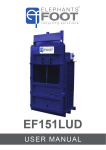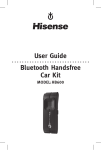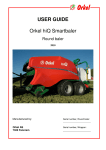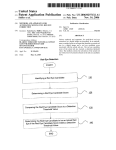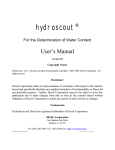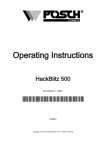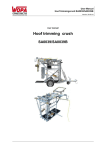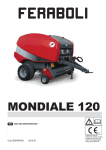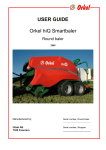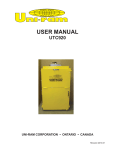Download Manual Contents - Elephants Foot Recycling
Transcript
R EF51 Single Chamber Baler Motor 1.1kW single phase Electrical connection 3 pin plug top Bale tying 2 x bale strapping Compaction force 4 tonne Manual Contents 1. Safety sheet 2. Declaration of conformity 3. Operating instructions 4. User guide 5. Diagram of baler fig. 1 6. Danger zones around baler fig. 2 7. Machine handling diagram fig. 3 8. Control panel diagram fig. 4 9. Circuit diagram fig. 5 10. Hydraulic diagram fig. 6 11. Typical serial plate fig. 7 12. Strapping diagram fig. 8 13. Training Record ELEPHANTS FOOT WASTE COMPACTORS PTY LTD ABN 70 001 378 294 Website: www.elephantsfoot.com.au - Email: [email protected] R 1 Safety Information 1.1 Overview This baler should only be used by competent personnel who have been adequately trained in correct baler operation and who have read and are familiar with the information contained in this manual. The EF51 complies with relevant directives as state d on declaration of conformity. During normal operation no protection guards or safety devices should be removed or interfered with in any manner. EF balers are designed so that, where possible, all moving parts are enclosed during operation to ensure operator safety. The operator should ensure that the motion of the baler endangers no other person. In particular the operator should ensure that nobody is inside the baler when it is being used. Do not attempt to interfere with any of the covers, switches, doors or any other part of the machine. If it is necessary to remove any guard, the machine should be isolated. Care must also be exercised in the following situations:Opening and closing the doors. When compacted material is in the baler, the door can be under considerable pressure and as such care must be taken when opening. Compacting material. Prior to compaction the operator should always satisfy themselves that no person or animal is in the compaction chamber and that no-one is going to be injured by their action. Bale handling. Proper lifting techniques should always be used to handle the bale. Bales in excess of 20 kg should not be lifted without using suitable lifting equipment e.g. bale trolley, forklift truck. Machine handling. If it is necessary to move the baler it should be moved in accordance with fig. 3 using a suitable forklift truck or pallet truck. Toxic material or potentially explosive material should not be compacted. At all times adequate ventilation should be provided around the machine and, if the material will give rise to dust or it is deemed necessary for any other reason, then suitable respiratory equipment and protective clothing should be worn depending on the material being compacted. This should be assessed by the end user and appropriate action taken. 1.2 Safety signs mounted on the machinery Signs are mounted in certain places on the machine, which warn of danger zones where special care is recommended. The safety instructions must be implemented without fail, otherwise safe operation of the baler cannot be guaranteed. The safety ELEPHANTS FOOT WASTE COMPACTORS PTY LTD ABN 70 001 378 294 Website: www.elephantsfoot.com.au - Email: [email protected] R instructions must not be painted over, removed or altered in any way. Signs which have become illegible, damaged or have been removed should be replaced at once. Warning – Dangerous Electrical Current Touching the Current carrying parts can lead to instant death Covers which are marked with this sign can only be removed by a technician after the relevant electric feed has been switched off. ELEPHANTS FOOT WASTE COMPACTORS PTY LTD ABN 70 001 378 294 Website: www.elephantsfoot.com.au - Email: [email protected] R Operating Instructions – EF51 2.1 General Operation Always load the material evenly in the machine Step 1. Feed strapping through machine as per fig 8 and loop ends over hooks on the base of the machine at the front. Step 2. Open top door. Step 3. Fill cardboard into chamber. Step 4. Close door. Step 5. Press cycle button - baler will automatically compress cardboard and return to starting position. Step 6. Open top door. Step 7. Repeat step 3-5 until the bale level is approx 25mm below the top of the bottom door. Step 8. Open the top door, pull the strapping across the bale and feed the strapping through the slots in the bottom door. Step 9. Close top door and press the down button. Step 10. Tie the bale off, taking care to remove any slack in the strapping. Step 11. Press the up button and remove the bale with trolley. ELEPHANTS FOOT WASTE COMPACTORS PTY LTD ABN 70 001 378 294 Website: www.elephantsfoot.com.au - Email: [email protected] R 3 User Guide ELEPHANTS FOOT Single Chamber EF51 User information Please read this carefully before using your EF51 B aler and keep it in a safe place for future reference. 3.1 Operation EF Balers are designed for ease of use. The waste is filled into the chamber through the open top and compaction is achieved by pressing a single button. The compaction cycle takes no longer than 45 seconds. Once sufficient waste has been compacted to form a bale, the bale is tied and removed from the baler. The baler should not be operated continuously without putting waste in, or tying a bale between cycles. Before operating ensure no animals or children are inside the machine. The EF51 Baler produced by EF International is designed to compact packaging waste especially cardboard and plastic. It gives you a number of advantages including:- 3.2 • saves space • tidy workplace • reduces the time spent managing waste • reduces waste disposal costs • facilitates recycling • helps to protect the environment Installation EF51 series balers use a 13-amp socket. ELEPHANTS FOOT WASTE COMPACTORS PTY LTD ABN 70 001 378 294 Website: www.elephantsfoot.com.au - Email: [email protected] R Machines should be installed indoors. For use in damp conditions an earth leakage circuit breaker must be used. Machines should be installed on level, stable ground It is recommended that the machine be bolted to the floor at the rear of the machine using M10 rawl bolts. Adequate ventilation should be provided around the machine. No attempt should be made to block ventilation paths on the machine. If machine is to be moved after initial installation, this should be done by a competent person using either a pallet truck or forklift truck. 3.3 Handling For transportation the press head should always be in the fully down position. The baler should at all times remain horizontal. The EF51 baler can be lifted from the side of the m achine with a fork lift or pallet truck. A competent operator of a fork lift truck must perform all handling. 3.4 Restrictions on use EF balers are designed to compact packaging waste, e.g. cardboard and plastic. It is recommended that the following waste is not put in the baler:1. Glass. For safety reasons glass should not be placed in a EF Baler. 2. Solids e.g. bricks, pieces of wood. Such items will not compress and could damage the machine. 3. Liquids. These will not compress and give rise to unnecessary mess. 3.5 Troubleshooting Before telephoning for service read through the following information. 1. Machine will not operate ELEPHANTS FOOT WASTE COMPACTORS PTY LTD ABN 70 001 378 294 Website: www.elephantsfoot.com.au - Email: [email protected] R • - With the top door open look at the lights on the control panel. If the lights on the control panel are NOT lit: Check the socket. Will other electrical appliances operate from it? Disconnect the baler from the electrical supply and check the fuse (13 amp). Check the supply lead for damage. Step 1. If two LEDs are flashing then the door safety switch is not properly engaged. Close the top door properly. Step 2. If all three LEDs are flashing, there are two possible causes firstly the temperature safety switch has cut out to protect the machine. Leave for 30 mins to allow cooling and then try again. Secondly it could be that the e-stop has been pressed. If this problem persists, stop using the baler and contact CK International Ltd. 2. Guards CK balers are designed so that all moving parts are enclosed during operation to ensure operator safety. Do not attempt to interfere with any of the covers, switches, doors or any other part of the machine. 3. Hydraulic oil The level of hydraulic oil should be checked every year. With the press plate in the raised position oil level should be approximately 35mm from the top of the tank. If an oil leak becomes apparent do not use the machine. 4. Routine cleaning The interior and exterior of the CK Baler should be kept clean using a damp cloth. Do not use a power hose to remove dirt. 3.6 Maintenance A record of all maintenance should be logged in the maintenance record. When performing maintenance or repairs to the machine, or if for any reason a guard should be removed, then the machine must be isolated. Bi-monthly: - Check safety switches. Check wires for any damage. Check all hydraulic connections for leaks. If any leaks are apparent, fitting should be tightened or if necessary the hose replaced. ELEPHANTS FOOT WASTE COMPACTORS PTY LTD ABN 70 001 378 294 Website: www.elephantsfoot.com.au - Email: [email protected] R Check oil level. With cylinders returned, oil should be approximately 35mm from the top of the tank. Grease all grease nipples Check all fittings are in place and secure. Check the door closing mechanism is in good working order. The interior and exterior of the EF baler should be kept clean. Do not use a power hose to remove dirt. Annually: - Hydraulic oil should be replaced. This may be required twice a year if operating in very dusty conditions. Hydraulic oil used is Renolin PW32. A competent person should perform oil and filter changes and any other fitting work. ELEPHANTS FOOT WASTE COMPACTORS PTY LTD ABN 70 001 378 294 Website: www.elephantsfoot.com.au - Email: [email protected] R FIGURE 5: EF51 Electrical Circuit ELEPHANTS FOOT WASTE COMPACTORS PTY LTD ABN 70 001 378 294 Website: www.elephantsfoot.com.au - Email: [email protected] R FIGURE 6: Hydraulic Circuit Diagram 1 ELEPHANTS FOOT WASTE COMPACTORS PTY LTD ABN 70 001 378 294 Website: www.elephantsfoot.com.au - Email: [email protected] R ELEPHANTS FOOT WASTE COMPACTORS PTY LTD ABN 70 001 378 294 Website: www.elephantsfoot.com.au - Email: [email protected] 2 1 1 1 1 EF151 range, EF250 Range, EFVX and EF500 range. EF151 range, EF250 Range, EFVX Range and EF500 range. EF151 range, EF250 Range, EFVX Range and EF500 range. Under normal working conditions the machine should not dissipate enough heat to harm user. There is access to the moving press plate through the slots used for tying, and the EF151 range, EF250 slots in the top door. These are sufficiently narrow to keep hands out. In addition Range, EFVX Range the press plate is travelling very slow and is therefore avoidable. and EF500 range. EF151 range, EF250 Range, EFVX Range and EF500 range. Follow the Noise at work regulation 2005 to minimise risk due to noise. The only components that could conceivably give rise to a fire are the electrical components and these are designed in accordance with the low voltage directive 2006. When tying a bale protective gloves and safety glasses must be worn. To aid cutting twine a safety knife is bolted to the door. Interlock on loading door to prevent access to any working parts. The operator should always check that there is no person or animal in the chamber before compacting. Noise Heat transfer through fluids and equipment Movement of parts Risk due to fire Injury to operator when tying the bale Entrapment Machine operation Machine operation Machine operation Machine malfunction Machine operation Machine operation 1 - EF151 range, CK250 Range, EFVX Range and EF500 range. All sharp edges are de-burr and/or rounded. Sharp edges Machine construction 1 - EF151 range, EF250 Cutting/Severing/Shearing of machine There are no components that are likely to break-up during foreseeable operation. Range, EFVX Range components and EF500 range. Machine construction EF151 range. 1 Machine should only be installed on level, firm ground and under these circumstances the machine is perfectly stable. During handling the machine should not be allowed to tilt anymore than 5 degrees. 5 3 3 2 2 2 - - 4 5* 3* 3 2 2 4 - - 4* Risk Rating on Implementation Likeli Severity Risk rating hood EF151 range, EF250 Range, EFVX Range and EF500 range. Machine affected Proposed Control Measures Risk Rating:- Likelihood x Severity 20 / 25 - Urgent, immediate action 12,15,16 - High priority action 8,10 - Medium priority action 4,5,6 - Low priority action 1,2,3 - No action, low priority Machine tipping over Nature of Risk Severity 5- fatality and/or major damage and major costs 4- major reportable injury and/or very high damage repair costs 3- injury with time lost and/or high damage repair costs 2- minor injury and/or low cost damage to plant/equipment etc 1- minor damage to plant/equipment/buildings Machine size Source of Hazard Likelihood 5- frequent - weekly 4- occasional - monthly 3- infrequent 2/3 per year 2- probable - annual 1- improbable Risk Assessment for Vertical Balers EF151 range, EF250 The pressplate will rise and the bale will be ejected when tipping, this cycle can not happen unless the operator is on one side with two hands on the tip switches. Range, EFVX and EF500 range. Any other personnel must stand well clear of the open door Risk due to moving parts Bale Ejection 2 EF151 range, EF250 Range, EFVX Range and EF500 range. Bales over 25kg should be removed by trolley. Any larger bale should be tipped onto a pallet and removed with either a forklift or pallet truck. Slips/Trips/Falls Bale handling Signed________________________ EF151 range, EF250 Range, EFVX and EF500 range. For machines with automatic tip the baler door prevents casual access from one side. If operator releases one button the eject operation stops. Safe working areas are documented in the user manual. Slips/Trips/Falls Bale removal * Installation and operation procedures must be followed EF250 Range, EFVX and EF500 range. A magnet switch on the loading door prevents access to any working parts. The operator should always check that there is no person or animal in the chamber before compacting. Machine affected Proposed Control Measures Entrapment Nature of Risk 1 2 2 1 4 2 3 5 4 4* 6* 5* Risk Rating on Implementation Likeli Severity Risk rating hood Risk Rating:- Likelihood x Severity 20 / 25 - Urgent, immediate action 12,15,16 - High priority action 8,10 - Medium priority action 4,5,6 - Low priority action 1,2,3 - No action, low priority Machine operation Source of Hazard Severity 5- fatality and/or major damage and major costs 4- major reportable injury and/or very high damage repair costs 3- injury with time lost and/or high damage repair costs 2- minor injury and/or low cost damage to plant/equipment etc 1- minor damage to plant/equipment/buildings Risk Assessment for Vertical Balers Likelihood 5- frequent - weekly 4- occasional - monthly 3- infrequent 2/3 per year 2- probable - annual 1- improbable R Baler Training Record Machine Serial Number: ………………………………………………………. Owner: …………………………………………………………………………. Training Date: ……………………… Instructor: ……………………………... We certify that we have undergone an initial training session on the above machine. We are satisfied that the safe method of working with the machine has been explained to our satisfaction. We feel confident in safely operating the machine in the following areas: Safe method of connecting / disconnecting power supply Safe use of operational controls Safe loading of machine How to form a bale and tie straps How to safely remove the bale from the machine Machine safety features Name Date Position Instructor ELEPHANTS FOOT WASTE COMPACTORS PTY LTD Operator Signature ABN 70 001 378 294 Website: www.elephantsfoot.com.au - Email: [email protected]














